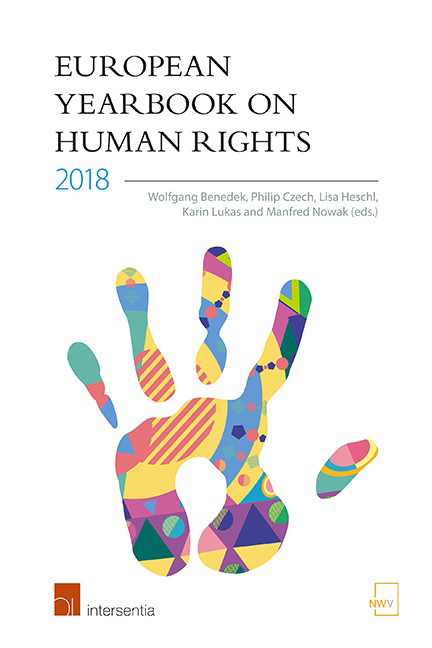Book contents
- Frontmatter
- Scientific Advisory Board
- Editors’ Preface
- Contents
- List of Abbreviations
- List of Contributors
- Part I Topic Of The Year
- Part II Eu
- Part III Coe
- PART IV OSCE
- Part V Others
- Part VI Book Reviews
- Katja S. Ziegler, Elizabeth Wicks and Loveday Hodson (eds.): The UK and European Human Rights – A Strained Relationship?
- Emily Reid: Balancing Human Rights, Environmental Protection and International Trade – Lessons from the EU Experience
- Nicole Bürli: Third-Party Interventions before the European Court of Human Rights
- Stijn Smet and Eva Brems (eds.): When Human Rights Clash at the European Court of Human Rights – Conflict or Harmony?
- Violeta Moreno-Lax: Accessing Asylum in Europe, Oxford Studies in European Law
- Mark Dawson: The Governance of EU Fundamental Rights
- Philip Leach: Taking a Case to the European Court of Human Rights, 4th Edition
- Sionaidh Douglas-Scott and Nicholas Hatzis (eds.): Research Handbook on EU Law and Human Rights
- Lauri Mälksoo and Wolfgang Benedek (eds.): Russia and the European Court of Human Rights – The Strasbourg Effect
- Index
Philip Leach: Taking a Case to the European Court of Human Rights, 4th Edition
from Part VI - Book Reviews
Published online by Cambridge University Press: 31 January 2019
- Frontmatter
- Scientific Advisory Board
- Editors’ Preface
- Contents
- List of Abbreviations
- List of Contributors
- Part I Topic Of The Year
- Part II Eu
- Part III Coe
- PART IV OSCE
- Part V Others
- Part VI Book Reviews
- Katja S. Ziegler, Elizabeth Wicks and Loveday Hodson (eds.): The UK and European Human Rights – A Strained Relationship?
- Emily Reid: Balancing Human Rights, Environmental Protection and International Trade – Lessons from the EU Experience
- Nicole Bürli: Third-Party Interventions before the European Court of Human Rights
- Stijn Smet and Eva Brems (eds.): When Human Rights Clash at the European Court of Human Rights – Conflict or Harmony?
- Violeta Moreno-Lax: Accessing Asylum in Europe, Oxford Studies in European Law
- Mark Dawson: The Governance of EU Fundamental Rights
- Philip Leach: Taking a Case to the European Court of Human Rights, 4th Edition
- Sionaidh Douglas-Scott and Nicholas Hatzis (eds.): Research Handbook on EU Law and Human Rights
- Lauri Mälksoo and Wolfgang Benedek (eds.): Russia and the European Court of Human Rights – The Strasbourg Effect
- Index
Summary
The European Convention on Human Rights from 1953 has played a very important role in the development and awareness of human rights across Europe. Without doubt, the European Court of Human Rights (ECtHR, the Court) in Strasbourg can be considered as the cornerstone of the Convention system. Nevertheless, the Court currently faces a backlog of over 55,000 cases. Additionally it is being confronted with renewed challenges of its legitimacy, which is exemplified by the Draft Copenhagen Declaration from February 2018, which was initiated by the Danish Chairmanship of the Council of Europe and has triggered again a political and academic debate on the role of the ECtHR.
Philip Leach does not directly enter into that debate with his new book, but rather provides a comprehensive handbook for lawyers, who intend to lodge an application with the ECtHR. However, his publication can still be seen as an important contribution in strengthening the Convention system as Tim Eicke, judge at the ECtHR, points out in his foreword, since the quality of the arguments advanced before the ECtHR is essential in ensuring the protection of the rights protected under the Convention (p. viii). Indeed, Leach‘s fourth edition Taking A Case to the European Court of Human Rights will not only support practitioners in their work, but also is an invaluable help for academics and students in gaining a better understanding of the Strasbourg system.
The book generally follows the structure of the previous three editions and starts with a short introduction on the history of the Council of Europe and the Convention and its Protocols. Leach continues with a detailed overview of the pre-judgement phase before the Court and describes how the practice of judgement and enforcement is regulated. An excellent summary of the underlying Convention principles is given in the fifth chapter. Most pages of his book (pp. 210–589) are dedicated to detailed commentary of the substantive rights of the Convention and its Protocols. For Articles 8–11, which are all similarly structured and oft en require that a balance between different rights is to be struck, Leach provides a very good overview of how the Court addresses this issue of conflicting rights (pp. 400–403).
- Type
- Chapter
- Information
- European Yearbook on Human Rights 2018 , pp. 615 - 618Publisher: IntersentiaPrint publication year: 2018



